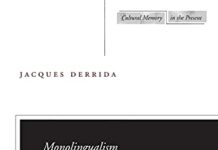
Ebook Info
- Published: 1991
- Number of pages: 148 pages
- Format: PDF
- File Size: 9.66 MB
- Authors: Jacques Derrida
Description
I shall speak of ghost, of flame, and of ashes. These are the first words of Jacques Derrida’s lecture on Heidegger. It is again a question of Nazism—of what remains to be thought through of Nazism in general and of Heidegger’s Nazism in particular. It is also “politics of spirit” which at the time people thought—they still want to today—to oppose to the inhuman.”Derrida’s ruminations should intrigue anyone interested in Post-Structuralism. . . . . This study of Heidegger is a fine example of how Derrida can make readers of philosophical texts notice difficult problems in almost imperceptible details of those texts.”—David Hoy, London Review of Books”Will a more important book on Heidegger appear in our time? No, not unless Derrida continues to think and write in his spirit. . . . Let there be no mistake: this is not merely a brilliant book on Heidegger, it is thinking in the grand style.”—David Farrell Krell, Research in Phenomenology”The analysis of Heidegger is brilliant, provocative, elusive.”—Peter C. Hodgson, Religious Studies Review
User’s Reviews
Editorial Reviews: From the Inside Flap “I shall speak of ghost, of flame, and of ashes.” These are the first words of Jacques Derrida’s lecture on Heidegger. It is again a question of Nazismof what remains to be thought through of Nazism in general and of Heidegger’s Nazism in particular. It is also “politics of spirit” which at the time people thoughtthey still want to todayto oppose to the inhuman.”Derrida’s ruminations should intrigue anyone interested in Post-Structuralism. . . . . This study of Heidegger is a fine example of how Derrida can make readers of philosophical texts notice difficult problems in almost imperceptible details of those texts.”David Hoy, London Review of Books”Will a more important book on Heidegger appear in our time? No, not unless Derrida continues to think and write in his spirit. . . . Let there be no mistake: this is not merely a brilliant book on Heidegger, it is thinking in the grand style.”David Farrell Krell, Research in Phenomenology”The analysis of Heidegger is brilliant, provocative, elusive.”Peter C. Hodgson, Religious Studies Review From the Back Cover ‘Derrida’s ruminations should intrigue anyone interested in Post-Structuralism. . . This study of Heidegger is a fine example of how Derrida can make readers of philosophical texts notice difficult problems in almost imperceptible details of those texts.’ About the Author Jacques Derrida (1930–2004) was director of studies at the école des hautes études en sciences sociales, Paris, and professor of humanities at the University of California, Irvine. He is the author of many books published by the University of Chicago Press. Geoffrey Bennington is the Asa G. Candler Professor of Modern French Thought at Emory University. He is the author of several books on Derrida and translator of many others by him, and he is coeditor of The Seminars of Jacques Derrida series. Read more
Reviews from Amazon users which were colected at the time this book was published on the website:
⭐This title is in beautiful condition and made me think I should buy only cloth. The wear is often not something that can be controlled as well in a paperback. I’m also accustomed to seeing underlining in some portion of a used book, but this was clean throughout. I find underlining of any kind very annoying.
⭐for an enlightened mind. I bought this as a gift for a dear friend who is a philosophy major. He found it very informative.
⭐A very nice book, well, what do you expect, it is Derrida, Yet it is not his central work, one should already know what’s going on to understand it. I proprose to begin with the “Margins of philosophy”, but I myself am a Derrida amateur.)
⭐The book goes on and on with very complicated vocabulary that is not explained hard to look up only a professional philosopher would get anything out of this book the average reader we get almost nothing out of it and he makes Heidegger more complex which is a real crime. To make things more complex is to turn people off of philosophy and it is elitist in the extreme it’s not as complicated as he’s making it and to make things more complicated and more elite is undemocratic and idiotic never buy this book and this philosopher is totally overrated.
⭐If you read this book, you might notice how one century tends to follow another, but certain problems could crop up, particularly in places which don’t define the world quite like we do, philosophically or religiously. I expected to spend a full weekend trying to figure out what this book has to say, but it dropped right into my preconceptions.Some questions are more unsettling than others, and the question of spirit in Heidegger is worse when Derrida makes it perfectly clear that Heidegger knew how to avoid the question in purely philosophical works, firstly in Sein und Zeit, but treated spirit like a bandwagen that “the leap” (p. 32) would land on for those “in the movement of an authentication or identification which wish themselves to be properly German” (p. 33) in his famous Rectorship Address six years later, in 1933. The key paragraph of that address pictures the Germans, for whom the “will to essence creates for our people its most intimate and extreme world of danger, in other words its true spiritual world.” (p. 36) My confusion about this doesn’t really start until page 41, where “Spirit is its double.” The consideration moves to the Einfuhrung (1935) which “repeats the invocation of spirit launched in the Address. It even relaunches it, explains it, extends it, justifies it, specifies it, surrounds it with unprecedented precautions.” (p. 41). What has become a concern for Heidegger is “The darkening of the world implies this destitution of spirit, its dissolution, consuming, its repression, and its misinterpretation. We are attempting at present to elucidate this destitution of spirit from just one perspective, and precisely that of the misinterpretation of spirit. We have said: Europe is caught in a vice between Russia and America, which metaphysically come down to the same thing in regard to their belonging to the world and their relation to spirit.” (p. 59). The collapse of German idealism a century earlier was, to Heidegger, the problem of an age “which was not strong enough to remain equal to the grandeur, the breadth, and the original authenticity of this spiritual world, that is, to realize it truly.” (p. 60). I dropped a lot of German words from the passages I quoted, and the bracketed “[to the character of their world, or rather to their character-of-world, Weltcharakter]”, for the benefit of those who might have thought that he already said that. Plenty of attention is paid to language, but of all the foreign words which might mean spirit, I’m barely aware of how the Latin word spiritus might be sung in church with a different meaning than how German philosophers arrogate about geistliche or Geistigkeit.Page 63 has a sentence on how the metaphysics of the latter word as well as the Christian value, “a word which will itself thus find itself doubled” form some “profound relationship with what is said twenty years earlier of the darkening of world and spirit.” (p. 63). If you are following this, this might be the book for you, if you still want to know, “Heidegger names the demonic. Evidently not the Evil Genius of Descartes . . .” (p. 62).
⭐The question of Heidegger and politics has plagued (and will continue to plague) continental philosophy since Heidegger’s induction into the Recktorship under the Nazi regime in the thirties.Why did he? But, and perhaps more importantly, why does something like Nazism come up? What is it about the West that breeds this kind of pathological racism? And how could Heidegger, for all his time concerned with, and working on authenticity and inauthenticity get swept up in the most inauthentic political movement of the century?For Derrida, this kind of fascistic-nationalistic racism is not a problem of facticity, it is a problem of Spirit (Geist). Heidegger avoids the question and problem of Spirit, and it is a failure of his fundamental ontology and onto-theology.This is a fascinating lecture from the late Derrida, who investigates Heidegger in new and unfamiliar modes. He relates (what he and the majority of others perceives to be) Heidegger’s avoiding (vermeiden), of the question of Spirit ( Hegelian Geist). Avoiding means the saying without saying, the writing without writing, using words, without using them.”No one ever speaks of spirit in Heidegger” (pg.4), well now Derrida has provided us with the speaking.”The question of spirit must be recognized in indifference” (pg. 19), and Derrida performs this with remarkable coolness, though not lucidity.This lecture is about spirit, about politics, about Europe, and about language. All students of Heidegger should read it, as it is one of the best.
⭐An open question in the (by now) standard readings of Heidegger is his relation to Geist – spirit. From prescribed avoidance to evangelical inclusion over twenty five years, what motivated this change in Heidegger’s pronouncements on spirit?By following the formations, transformations, presuppositions and destinations of this sea change, Derrida once more opens the question of the question, that famous Heideggerian question or questioning which originates human kind: “Human being is that being which questions the being of its Being.”In reading any Derrida analytique, one is made aware all over again of the many echos surrounding every voice, every attempt to speak. This is particularly poignant with regard to Heidegger, and Derrida does not gloss over the German’s naziism as much as trace the hubris of his fallen state.Is there a conclusion? There is no conclusion. It’s enough to keep talking…not to interrupt.
⭐Excellent!
Keywords
Free Download Of Spirit: Heidegger and the Question in PDF format
Of Spirit: Heidegger and the Question PDF Free Download
Download Of Spirit: Heidegger and the Question 1991 PDF Free
Of Spirit: Heidegger and the Question 1991 PDF Free Download
Download Of Spirit: Heidegger and the Question PDF
Free Download Ebook Of Spirit: Heidegger and the Question





